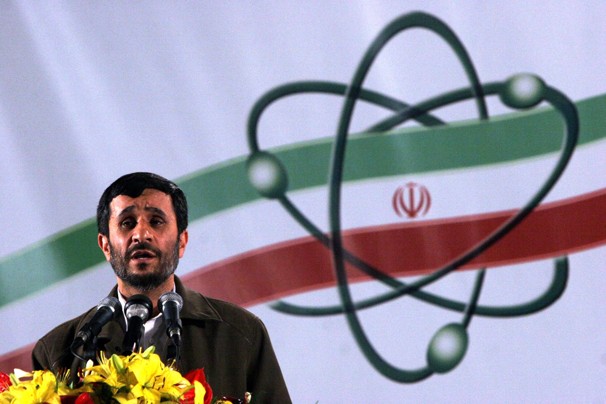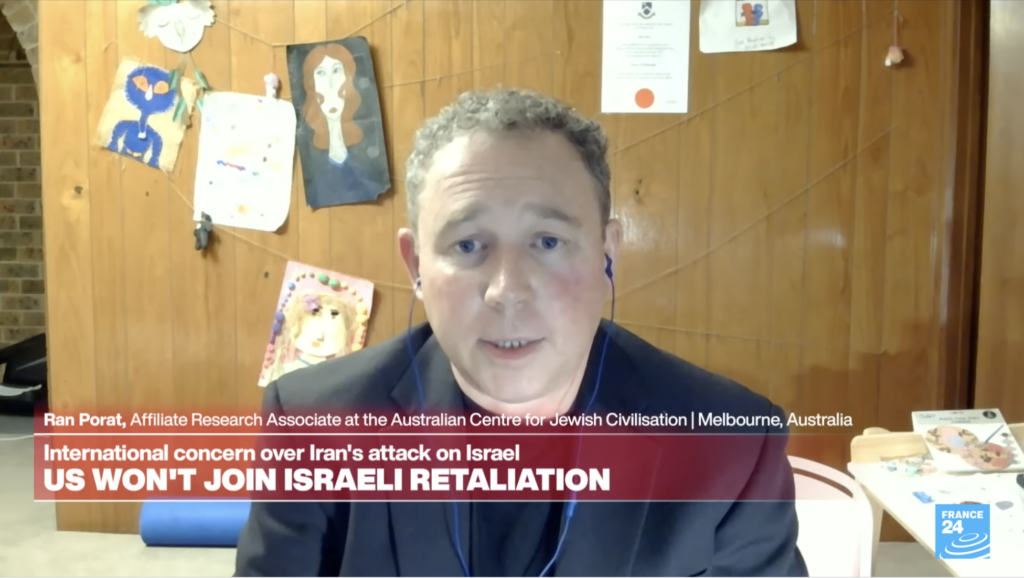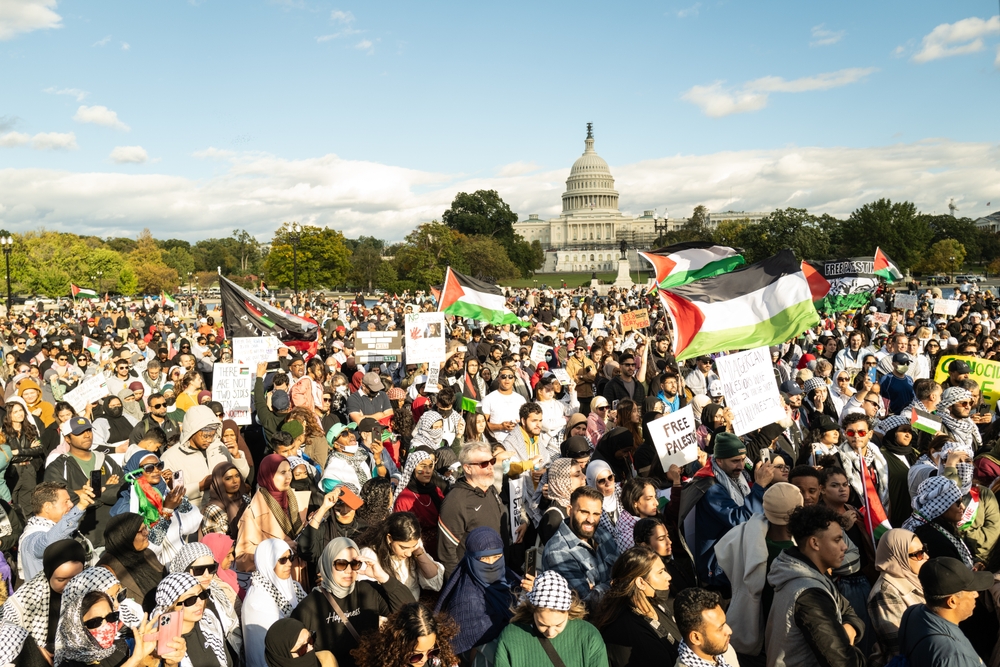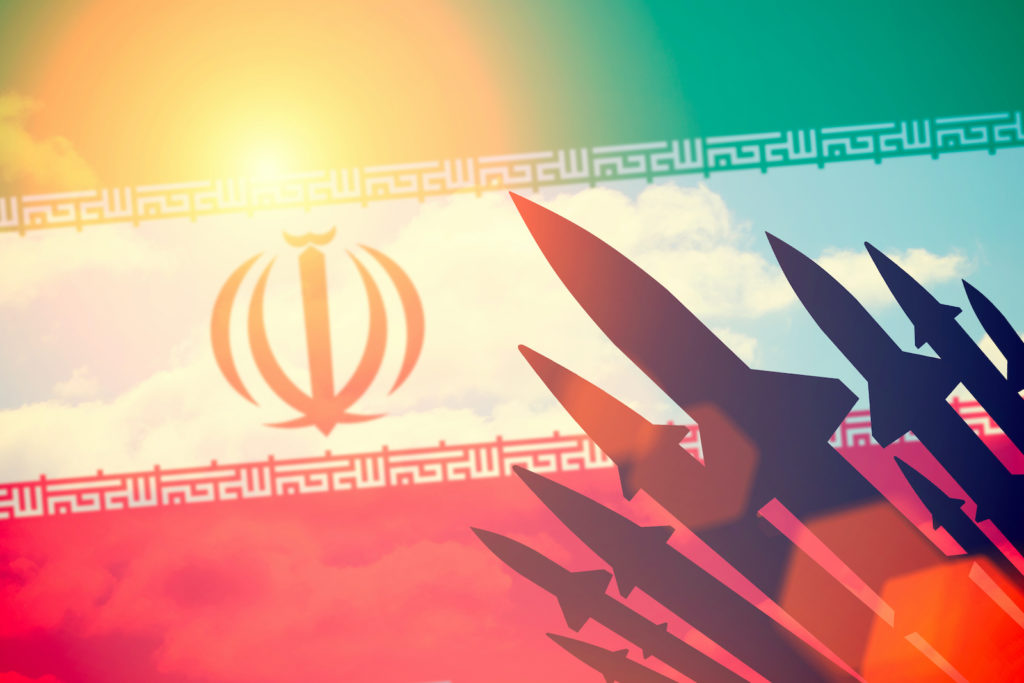UPDATES
Efforts to stop a Nuclear Iran coming to a bad end?
Oct 8, 2014

Update from AIJAC
October 8, 2014
Number 10/14 #02
This Update is devoted to some increasingly pessimistic prognoses that are increasingly appearing for the p5+1 (US, Russia, China, Britain, France and Germany) nuclear talks with Iran that are scheduled to be completed by Nov. 25.
First up is Canadian-American author and columnist David Frum, in a piece written for the Atlantic. Frum congratulates Iran’s negotiators, arguing they have convincingly won the encounter with their American and allied counterparts, even though, as of last year. the cards seemed to all be in the Americans’ hands as sanctions were having significant negative effects on the Iranian economy. He argues that it now appears that not only has the US effectively agreed to terms which will mean not only that “any final agreement will leave Iran paused on the verge of nuclear-weapons capability”, but that the Iranians successfully convinced the Americans that they had to bribe Teheran to agree to normalise relations with the US, rather than the reverse. For this important warning about where things appear to be headed over the coming two months, CLICK HERE. Others also arguing that the negotiations look basically over with agreement Iran can stay poised at the nuclear threshold are Emanuele Ottolenghi and the Wall Street Journal.
Next up is American columnist Cliff May, who places Iran’s apparent successes in gaining concessions in the nuclear negotiations into a larger pattern of gains being achieved across the Middle East for Teheran and its allies amidst the current chaos. He notes that in addition to the nuclear issue, the concentration on ISIS has meant that no attention is being paid to Iran’s extensive sponsorship of terrorism, and worsening human rights record at home, as well as the fact that Teheran – through its close ally former Iraqi PM Nouri Al-Maliki – unintentionally created the conditions for ISIS’s spread across Iraq. For his complete argument, CLICK HERE. More on Iran’s regional empowerment from experts Nir Boms and Shayan Arya.
Finally, Einat Wilf, a former Israeli Knesset member turned public intellectual, offers a slightly more optimistic take, arguing the US still has the leverage to stop a nuclear Iran if it only chooses to employ the economic tools it already has. She argues, like Frum, that Iranian negotiators have successfully outmanoeuvred their Western counterparts into both believing they are ferling no pressure, when in fact they are, and that fighting ISIS is a favour they can offer the West, when it is a fundamental interest Teheran will pursue in any case. For the rest of what she has to say, CLICK HERE. Meanwhile, Iran expert Ali Alfoneh offers evidence that – contrary to claims that it would benefit the “moderate” Rouhani faction in Iran – sanctions relief has primarily benefited the hardline, terror-supporting Iranian Revolutionary Guard Corp.
Readers may also be interested in:
- Noted science writer offers a detailed calculation, accessible to the non-expert, of the speed with which Iran could convert its current enriched uranium stockpiles into nuclear bomb fuel.
- Iran’s nuclear negotiators attend an antisemitic conference – full of 9/11 truthers and holocaust deniers – the regime is sponsoring this week. More on the conference here.
- A mysterious blast kills at least two at Iran’s Pachin military facility, long alleged to be a centre for research on nuclear weaponisation and bomb triggers. Israel said it had proof of bomb trigger testing at Pachin only two weeks ago.
- In another apparent gain for the Iranian axis, Shi’ite Houthi rebels, allegedly armed and assisted by Iran and Hezbollah, have effectively gained control of Yemen. More on the implications of this from experts Jacque Neriah and Simon Henderson.
- Iran announces it plans to execute one of its most famous dissidents – Ayatollah Hossein-Kazamani Boroujerdi – after having actually executed religious teacher Mohsen Amir-Aslani for interpreting stories in the Koran metaphorically in late September.
- More and more is coming out about Qatar’s support for terrorism across the Middle East – see here, here, here, and here.
- Isi Leibler writes about the extremely harsh response in Washington to supposed Israeli “announcements” (see below for why this is questionable) on construction in Jerusalem at Givat Hamatos.
- Some examples from the many stories and comments now appearing at AIJAC’s daily “Fresh AIR” blog:
- Gabrielle Debinski and Tzvi Fleischer analyse the realities behind the controversy over Givat Hamatos – arguing that there was actually no new construction announced and that the whole controversy was the result of a political stunt by a left-wing Israeli NGO.
- AIJAC highlights some important lessons about Australian Middle East policy in former PM Julia Gillard’s new memoir “My Story.”
- Sharyn Mittelman on the importance for Israel-India ties of the meeting in New York last week between Indian PM Modi and Israeli PM Netanyahu.
How Iran Scammed America Out of a Nuclear Deal
You have to salute the rulers of Iran. They stand on the verge of scoring a stunning diplomatic triumph over the United States. Even more impressive: They did it all on bluff. Their adversaries possessed material advantages in terms of money, technology, military power, and more. But Iran’s rulers had clarity of purpose and the will to win. Without these qualities, the adversaries’ material advantages have seeped away.
A year ago, the rulers of Iran faced disaster. Their currency had lost three-quarters of its value, due in largest measure to the tough economic sanctions drafted by Senators Mark Kirk and Robert Menendez in 2011, and very reluctantly signed into law by President Obama at the beginning of 2012. Inflation was raging, unemployment was surging. Their most useful regional ally, the Syrian regime’s Bashar al-Assad, seemed doomed to destruction, attacked from within by a violent uprising and threatened from without by Obama’s commitment to intervene to stop Assad’s use of chemical weapons.
Today, the United States and Britain are coordinating bombing missions with Assad, not against him. Iran has obtained considerable sanctions relief. Its currency has strengthened, inflation has abated, and foreign trade and investment are reviving. The United States has progressively reduced its demands for nuclear limits on Iran. The New York Times reports that the Obama administration has retreated from the longstanding demand that Iran dismantle its nuclear centrifuges, instead merely calling for Tehran to disconnect them from each other. Iran’s nuclear-enrichment capacity would remain intact, and Iran could resume its progress toward a weapon at almost any time, at the price of only the delay necessary to reconnect the maze of tubing.
This most recent proposal marks the latest in a series of American climb-downs. Iranian negotiators have sniffed at each round of American concessions and insisted on more. As best as outsiders to the talks can tell, they have obtained them. On the present trajectory, any final agreement will leave Iran paused on the verge of nuclear-weapons capability—and this time, with the U.S. having signed away any non-military means of preventing Iran’s final drive to complete a bomb.
What an extraordinary negotiating achievement! They should teach it as a case study in business schools. How on earth did the rulers of Iran do it?
Iran entered negotiations with something to sell and something to buy. The thing to sell was the nuclear program; the thing to buy was a more normal relationship with the United States and the Western world.
The talks began because the United States possessed powerful means of compulsion against Iran: from sanctions, to sabotage, to military force. But the rulers of Iran took the measure of their opposite numbers. They recognized that their counterparts were nearly as averse to using those means of compulsion as were the Iranians themselves. A stick that your adversary dreads using is no stick at all.
The United States also had carrots to offer, above all the relaxation of sanctions and a more normal U.S.-Iran relationship. Yet even before ISIS advanced in northern Iraq, the Obama administration had made up its mind that this carrot was something that the United States needed even more than Iran did. Just as a stick that you dread using is no stick at all, so a carrot that you yourself crave ceases to be much of a carrot.
The unsurprising result: The United States—which began the nuclear talks from a position of strength—has acted throughout the negotiations like the weaker party. The U.S. visibly hungered for a deal, and Iran took advantage of that hunger. One noteworthy milestone on the way to the U.S. collapse was the July decision to grant a six-month extension of the nuclear talks just 20 days after Secretary John Kerry had published an op-ed in The Washington Post warning that no extension would be forthcoming unless Iran showed “genuine willingness to respond to the international community’s legitimate concerns.” Iran instead remained obdurate—and got the extension anyway. From that point onward, the Iranian negotiators had every reason to believe that they had gained the upper hand against their weaker-willed foes.
The rulers of Iran brilliantly upended the whole grammar of the negotiation. Instead of offering their nuclear program to get rapprochement, they began offering rapprochement in exchange for the U.S. accepting a higher level of Iranian nuclear capacity. They convinced the Americans that the thing Iran most desperately needed—a rapprochement with the United States—was in America’s interest even more than theirs. They convinced the Americans that it was America, not Iran, that should therefore make nuclear concessions to achieve this rapprochement. In the annals of flimflam, there stand few more impressive achievements. We are heading toward an outcome in which Iran will not only get everything it wanted, but also will pay nothing for it. And not only will the U.S. have been thoroughly scammed, but the victims of the scam will brief friendly journalists about their diplomatic triumph—and, even more pitifully, will believe it.
David Frum is a senior editor at The Atlantic.
Back to Top
————————————————————————
Iran Rising
Cliff May
Israel Hayom, Oct. 1, 2014
In his address to the U.N. General Assembly last week, U.S. President Barack Obama called the conflict in the Middle East “a fight no one is winning.” I think the evidence suggests he’s wrong. I think Iran is making significant gains.
That should distress us because the Islamic republic, no less than the Islamic State group, is committed to waging jihad. Iran’s 1979 revolution was led by Ayatollah Ruhollah Khomeini, a Persian, Shiite, Islamist version of Lenin. His intention: to spark a global uprising against the West.
Khomeini championed social justice — of a sort.
“If one permits an infidel to continue in his role as a corrupter of the earth,” he said in a 1984 speech celebrating the birth of the Prophet Muhammad, “the infidel’s moral suffering will be all the worse. If one kills the infidel, and this stops him from perpetrating his misdeeds, his death will be a blessing to him.”
Among Khomeini’s disciples: Iranian Supreme Leader Ali Khamenei and Iran’s current president, the “moderate” Hassan Rouhani. Last year, Rouhani observed: “Saying ‘Death to America’ is easy. We need to express ‘Death to America’ with action.” His most strategic action to date: pushing back Obama’s red lines on Iran’s acquisition of a nuclear weapons capability.
My colleague Mark Dubowitz observes that Obama has gone from “dismantle and disclose” to ”disconnect, defer and deter.”
In other words, the president had been demanding that Iran’s rulers dismantle key elements of their nuclear program and disclose past weaponization activities. Now he appears prepared to settle for disconnecting some centrifuges or reducing the uranium gas fed into them (both easily reversible), deferring demands that Iran’s rulers admit past weaponization until after a deal is signed, and hoping that a breakout to nuclear weapons can be deterred through enhanced inspections and whatever economic leverage the West retains — probably not much, since a senior official in charge of the negotiations is already promising to suspend major sanctions soon after a deal.
Obama’s retreat also is reflected in his rhetoric. A few years ago he was vowing to use “all elements of American power to prevent Iran from developing a nuclear weapon.” Last week: ”America is pursuing a diplomatic resolution to the Iranian nuclear issue. This can only happen if Iran takes this historic opportunity. My message to Iran’s leaders and people is simple: Do not let this opportunity pass.” Opportunity?
This should be big news. Among the reasons it is not: Islamic State’s flamboyant barbarism has been consuming the oxygen, making it easy to forget that Iran has long been, according to the U.S. State Department, the world’s leading state sponsor of terrorism.
It was Iran’s rulers who instructed Hezbollah, their Lebanon-based militia, to bomb the U.S. Marine barracks in Beirut in 1983. It was Iran’s elite Quds Force that was implicated in the unsuccessful 2011 plot to blow up a Washington restaurant. Since 2003, Iran and its militias have, with impunity, killed as many as 1,000 American soldiers in Iraq.
Right now, both the Quds Force and Hezbollah have “boots on the ground” in Syria, fighting in support of the Assad regime. They have been responsible for a high percentage of the 200,000 deaths there over the past three years.
Within Iran, since Rouhani became president, roughly 1,000 Iranians have been executed. Just last week, Ahmed Shaheed, the U.N.’s special investigator on human rights in Iran, released a report detailing multiple cases of torture, rape, electroshock, burnings, amputations and floggings.
Saeed Abedini, an Iranian-American Christian pastor, has spent more than two years in Iranian prisons, charged with “attempting to sway Iranian youth away from Islam.” Arizona-born Amir Hekmati, a former U.S. Marine who went to Iran in 2011 to visit his grandmother, remains incarcerated on charges of spying for the CIA. Robert Levinson, a private investigator and former FBI agent, has been held in Iran since 2007.
Iran has ranked “among the world’s top three worst jailers of the press every year since 2009,” according to the Committee to Protect Journalists. Among those being held: Washington Post correspondent Jason Rezaian and his wife, Yeganeh Salehi, also a reporter. Arrested in July, they have yet to be charged with any crime.
Iran’s rulers don’t like Islamic State — it’s a Sunni rival — but they are largely responsible for its growth.
“At Iran’s behest, Nouri al-Maliki’s Shiite-led government in Iraq systematically arrested, tortured and murdered members of that country’s Sunni minority,” wrote Adam Ereli, former U.S. ambassador to Bahrain. Such policies “paved the way for the stunning political and military conquests in Iraq by Islamic State terrorists.”
It was Obama’s withdrawal from Iraq — with not even a residual force left behind — that made it possible for Tehran to start calling the shots in Baghdad. And his passive response to the Assad regime’s brutal crackdown on peaceful protesters in 2011 created the vacuum that soon was filled by foreign jihadis.
At this point, dropping bombs on Islamic State fighters is a treatment, not a cure. Worse yet: The current campaign could succeed in weakening Islamic State while strengthening the Islamic republic. If that happens, if Khamenei achieves his ambition to become the world’s first nuclear-armed jihadi, Obama will be responsible for a blunder of worldwide, historical proportions — one that will shape the remainder of this century.
Not much time is left to avoid that outcome. Negotiations with Iran are to conclude Nov. 24. The president would be wise to make clear that no agreement is preferable to a bad agreement. Such a decision will require courage, resolve and recognition that negotiations, like wars, do produce winners and losers, and that it matters which the United States turns out to be.
Clifford D. May is president of the Foundation for Defense of Democracies and a columnist for the Washington Times.
————————————————————————
Don’t Let Iran Off the Hook on Nuclear Talks
As world leaders have turned their attention to fighting the “network of evil” that is the Islamic State, the powers negotiating with Iran are perhaps considering easing their pressure on the Islamic Republic, thinking that “the enemy of the enemy is my friend.”
This thinking is wrong.
Not only is the enemy of my enemy still my enemy when it comes to the Middle East, but in these negotiations the Iranians are under far greater duress than their suave demeanor and presentations of being an ally of the West portray.
Leaders of the P5 + 1 negotiating powers should not underestimate or underplay their hand. They are in an excellent negotiating position and should be able to secure an agreement that leaves Iran far from being able to pursue a military nuclear program.
There is one thing that the Iranian regime cares about more than its nuclear program, and that is its own survival. If – from the Iranian perspective – the path to regime preservation is more likely to be secured by dismantling their nuclear program than by continuing it, then the program will be dismantled. This equation is simple. Getting the Iranian regime to reach this conclusion has been the challenge.
But it appears that Tehran is at least beginning to make this calculation. The Iranian regime is facing twin threats to its survival: the economic sanctions put in place by Western powers, and the overall context of the Arab Spring – from the Islamic State to the Green Revolution. These pressures have been magnified by internal schisms and disputes among the regime’s major players.
As the regime seeks to secure its future stability, it finds an appealing model to its east – and it is not North Korea – it is China. Iran cannot pursue the path of North Korea in the goal of regime preservation. Its people are too numerous, too educated, and too independent to accept such a closed and repressive existence as that suffered by the North Koreans. Even in Iran, repression has its limits and the Ayatollah regime cannot rely on it forever to preserve itself. But China presents a more intriguing option.
Like Iran after the Green Revolution, China too brutally repressed the protests of Tiananmen Square. But soon thereafter China embarked on the second and most productive phase of its “pinyin” – Change, Reform, Open-Up – policy of economic reforms. This policy, described as “Socialism with Chinese Characteristics,” was in effect a process of carefully controlled opening of the economy in a ruthlessly capitalistic manner , all the while maintaining strict party control and the power of the Communist Party. The high growth rates generated by this policy enabled the Chinese Communist Party to placate the population while securing its power. For the Iranians, the Chinese model for regime preservation is highly attractive.
The only thing standing between the Iranians and the realization of this policy is the Western sanctions. The sanctions are hurting Iran, but its leaders are trying not to show it. Not unlike Scarlett O’Hara, who sews a fancy dress from the drapes of her estate to hide her poverty and dire need as she goes to Rhett Butler for money, so too are the Iranians putting up a great show of relaxed negotiations, greatly aided by the perception that their fight against the Islamic State is somehow a favor to the West. They take great care to make statements that present themselves as coming to the negotiating table as proud and independent equals, rather then needy cousins.
Just as Rhett Butler was not fooled, neither should the negotiating powers be. Iran needs the West twice over – to ease sanctions and to fight the Islamic State. Western leaders are negotiating from a position of strength. In controlling the sanctions regime while fighting the Islamic State, they hold the key to what the Iranian regime requires for its preservation, and there is nothing that the Ayatollah regime values more. The powers have a very strong hand. They should not underplay it, and should not be fooled into thinking that their hand is weak. There is an opportunity to reach a good deal – one that is good for the world and good for the Iranian people. This opportunity should not go to waste.
Dr. Einat Wilf is a Senior Fellow with the Jewish People Policy Institute and an Adjunct Fellow with the Washington Institute. Dr. Wilf formally served on Israel’s Foreign Affairs and Defense Committee during her time in the Knesset.
Tags: International Security











